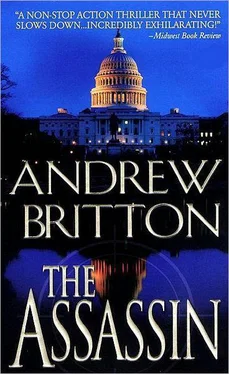Andrew Britton - The Assassin
Здесь есть возможность читать онлайн «Andrew Britton - The Assassin» весь текст электронной книги совершенно бесплатно (целиком полную версию без сокращений). В некоторых случаях можно слушать аудио, скачать через торрент в формате fb2 и присутствует краткое содержание. Жанр: Триллер, на английском языке. Описание произведения, (предисловие) а так же отзывы посетителей доступны на портале библиотеки ЛибКат.
- Название:The Assassin
- Автор:
- Жанр:
- Год:неизвестен
- ISBN:нет данных
- Рейтинг книги:3 / 5. Голосов: 1
-
Избранное:Добавить в избранное
- Отзывы:
-
Ваша оценка:
- 60
- 1
- 2
- 3
- 4
- 5
The Assassin: краткое содержание, описание и аннотация
Предлагаем к чтению аннотацию, описание, краткое содержание или предисловие (зависит от того, что написал сам автор книги «The Assassin»). Если вы не нашли необходимую информацию о книге — напишите в комментариях, мы постараемся отыскать её.
The Assassin — читать онлайн бесплатно полную книгу (весь текст) целиком
Ниже представлен текст книги, разбитый по страницам. Система сохранения места последней прочитанной страницы, позволяет с удобством читать онлайн бесплатно книгу «The Assassin», без необходимости каждый раз заново искать на чём Вы остановились. Поставьте закладку, и сможете в любой момент перейти на страницу, на которой закончили чтение.
Интервал:
Закладка:
Unfortunately, there were a number of witnesses to the incident outside the club. The trial moved forward rapidly, and the jury returned the expected verdict. Convicted of second-degree murder, Mason was sentenced to thirty years in the Attica Correctional Facility in upstate New York. Despite the overwhelming evidence against him, he immediately appealed the conviction and set to work. In the end, it was remarkably easy; he bribed two guards to smuggle in a cell phone and charger. Then he began to spread the word. When the hearing took place at the New York Court of Appeals the following spring, three of the witnesses for the prosecution recanted their testimony. Mason was immediately accused of using his contacts in the city to intimidate them, but no proof could be found to support that claim. Furthermore, the weapon used in the murder had since disappeared from a police evidence room. The conviction was overturned, and a new trial ordered, but a second arraignment never took place; by the following year, the DA had moved on to easier targets. Anthony Mason was a free man.
Unfortunately, the entire affair earned him a certain notoriety, which resulted in round-the-clock police surveillance. Eventually, the pressure caught up to him. A second conviction in 1993 — this one for assaulting a police officer — sent him back to Attica for a three-year stint. After his first month inside, Mason swore that he’d never again return to prison. By 1973, New York’s Rockefeller laws had imposed lengthy sentences for even minor drug-related offenses. Mason had lost his desire to test the limits of those laws, even though he’d never actually been charged under them. By the time he was released in ’96 — two months early for good behavior — he had turned his attention to a booming new business with less risk and plenty of room for expansion: the black-market sale of Class III weapons.
Anthony Mason fell easily into this new enterprise. He had plenty of capital stashed away, tens of thousands in offshore accounts, and numerous contacts throughout the city. His operation expanded at a frenetic pace during the explosion of U.S. gang violence in the early nineties, but for a number of reasons, he never quite made it into the international markets. He knew what was out there: unlimited access to the tons of small arms and ammunition moving out of Ukraine following the collapse of the Soviet Union, the demand for Eastern bloc weapons in Sierra Leone and other parts of Africa, as well as the insatiable appetites of the Middle East’s various terrorist groups, the most prominent of which was the PFLP — the Popular Front for the Liberation of Palestine. But for Mason, all of that remained just out of reach. He just didn’t have the necessary connections to step into the world arena.
All of that had changed just six months earlier. His link to the Iraqis had been arranged through Robert Boderon, a shadowy international figure Mason knew only by reputation. At Boderon’s request, a meeting was set up through a mutual contact. The offer put forth at that first meeting was simple but very enticing: movement of not less than $150,000 worth of weapons a month, with Mason receiving 50 percent of the profits for transportation alone. Boderon was responsible for acquiring the weapons themselves.
He had been reluctant at first: it seemed too good to be true, and the bargain required that he take a more hands-on approach, which was dangerous for obvious reasons. Eventually, though, his greed overcame his concerns. Now, as he stared at the rows of matte black plastic, he thought about what this one transaction would mean for his reputation as well as his bank account: more than $450,000 in profit alone, once Boderon took his cut. Some of that would be needed to set up a new base of operations — he’d been moving weapons out of this particular warehouse for nearly a month, and he knew it was time to move — but even after expenses, he’d still walk away with plenty of purchasing power. Boderon had access to some new weaponry that the Arabs would love to get their hands on, and Mason was more than willing to meet their needs — as long as they continued to meet his price.
Ronnie Powell interrupted his reverie. “Tony, I can’t find the keys to the forklift.”
Annoyed, Mason walked over and checked the ignition, which was empty. “Fuckin’… They’re probably up in the office.”
“I’ll get ’em,” the other man intoned.
“Don’t worry about it. Just finish this shit,” Mason replied, pointing to the unsecured cases. “I’ll get ’em myself.”
Powell shrugged and reached for his end of another case as Mason started up the stairs to the second floor, the iron steps heaving beneath his heavy frame.
Inside the CP, Ryan Kealey was holding a warm Coke and staring at the wall opposite the bank of monitors. Taped to the peeling wallpaper were blurry blueprints for the warehouse on Duke Street, as well as hand-drawn maps indicating possible insertion points for the D.C. SWAT teams. As he went over the diagrams, Kealey thought that raiding the building was, at best, a risky proposition. Normally, he would have accounted for the fact that he had only arrived a few minutes earlier, but in this case, the assault teams were no better off. They’d only been pulling surveillance for two days, and though they were set up in the garage on the ground floor, Kealey didn’t think they would have had time to go through the usual exhaustive preparations. In other words, the raiders were hardly prepared for what lay ahead.
According to the blueprints, the exterior walls of the warehouse were constructed of reinforced cement, and the doors were steel, two inches thick, embedded in stout frames of the same material. Besides the roll-up vehicular entrance, there were only two points of entry on the south side of the building, which opened up onto Duke Street, and no way in from the back. To make matters worse, the assaulters would have to cross fifty feet of open ground before they could even get to the doors, which would have to be breached with explosives, causing yet another dangerous delay. The place was a veritable fortress, ideally equipped for a defensive stand.
Kealey turned away from the diagram and surveyed the cramped room. Harper was standing a few feet away, talking to someone on his cell phone, as was Samantha Crane. Matt Foster, drifting nearby, caught Kealey’s eye and walked over. He had removed his suit jacket, revealing a starched white shirt and a hand-tooled leather shoulder holster. The grip of his service weapon poked out from beneath his left arm.
Foster nodded toward the blueprints and said, “It’s a nightmare, isn’t it?”
Kealey started, surprised to hear the other man say what he had just been thinking. “Yeah, as a matter of fact. I don’t know how you plan on pulling it off.”
“Well, it’s not really up to us, you know. We had some concerns as well, but Sam was overruled.”
Sam? What was the deal between these two? “I thought she was in charge.”
“It kind of looks that way,” Foster agreed. “See that guy over there?”
Kealey followed the other man’s gaze to a slight, balding man in an off-the-rack, lightweight linen suit. The older man was sandwiched between two subordinates, both of whom were taller, better dressed, and far more representative of the typical agent.
“That’s Craig Harrington, the assistant director in charge for the Washington field office,” Foster explained. “Technically, he’s the guy running things, but he’s got a lot on his plate, so he handed it off to Sam. The WFO called her in a few days ago, when they first got a line on Mason. She was running the investigation down in New York, and she’s done some good work with the JTTF in Dallas, so they figured she was best equipped to deal with it.”
Читать дальшеИнтервал:
Закладка:
Похожие книги на «The Assassin»
Представляем Вашему вниманию похожие книги на «The Assassin» списком для выбора. Мы отобрали схожую по названию и смыслу литературу в надежде предоставить читателям больше вариантов отыскать новые, интересные, ещё непрочитанные произведения.
Обсуждение, отзывы о книге «The Assassin» и просто собственные мнения читателей. Оставьте ваши комментарии, напишите, что Вы думаете о произведении, его смысле или главных героях. Укажите что конкретно понравилось, а что нет, и почему Вы так считаете.












